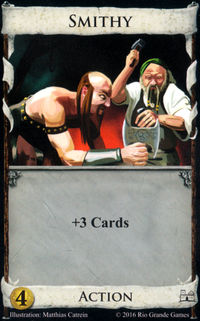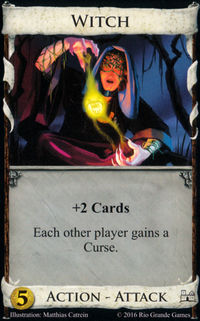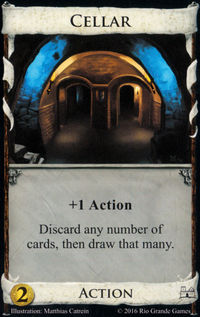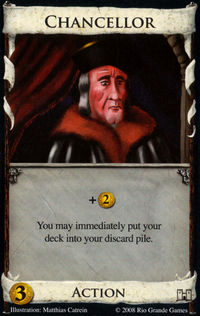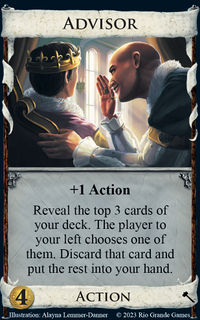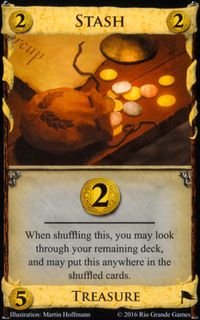Reshuffle
Werothegreat (Talk | contribs) |
Werothegreat (Talk | contribs) |
||
| Line 1: | Line 1: | ||
| − | + | '''Reshuffle''' is when a player turns over their discard pile and shuffles it to replace their empty deck. | |
| − | + | == Official Rules == | |
| + | * When his Deck is exhausted '''and''' the player needs to [[draw]] or reveal cards from his Deck, he shuffles his Discard pile to reform his Deck. He does not shuffle his Discard pile until he needs to reveal or draw a card from his Deck and cannot. | ||
| + | * At any point in the game, if a player has to draw or reveal more cards than are remaining in his Deck, he must draw or reveal as many as he can and then shuffle his face-up Discard pile to form a new face-down Deck. Then, he draws or reveals the remaining number of cards from his newly shuffled Deck. | ||
| − | + | == Examples == | |
| + | # You play a {{Card|Smithy}} and need to draw 3 cards. However, you only have 2 cards in your (draw) Deck (and some other cards in your discard pile). In this case, you would pick up the 2 cards in your deck, then reshuffle your discard, make it your new deck, then take the last card needed from the top of this new deck. You would ''not'' reshuffle first and then take the top 3 cards of the new deck. | ||
| + | # {{Card|Witch}} is in the kingdom and your opponent has bought one. After your turn, you have 5 cards in hand and none in your draw deck, and several miscellaneous cards in your discard pile. One of the cards you have in hand is a {{Card|Smithy}}. However, you ''cannot'' choose to reshuffle until your turn when you play {{Card|Smithy}} and are required to draw cards. | ||
| − | + | In this (second) example, the timing of the reshuffle has real, practical consequences. If your opponent plays {{Card|Witch}}, (barring other conditions) you will gain a {{Card|Curse}} to your discard pile; if your discard has already been reshuffled (when it shouldn't have been) into your new deck, you won't have the chance of drawing this {{Card|Curse}} from {{Card|Smithy}}. That's a distinct advantage to you. | |
| − | + | == Strategy == | |
| + | Knowing when to reshuffle (or, perhaps more importantly, when not to) is a crucial part of advanced Dominion play. If you reshuffle during your turn, any cards currently in your hand or in play, and any you gain later that turn, will not be shuffled into your deck, meaning you will not be able to use them until after your next reshuffle. If you play draw cards unthinkingly, causing you to do this, you may wind up with a deck full of undesirable cards, and a couple turns where you aren't able to do anything useful. This is particularly true with a card like {{Card|Cellar}}; if you discard too many cards, all the cards you wanted out of your hand will be shuffled back into your deck, and you might draw them all back again anyway. | ||
| − | + | On the other hand, frequent reshuffling can mean playing your important cards more often, so long as they end up in your discard pile in time. Cards like {{Card|Chancellor}} are specifically intended to expedite that; the sometimes opaque benefit of shuffling more often leads to many new players underestimating such cards, or even not understanding their purpose. However, the mere act of shuffling every turn does not necessarily indicate a good deck; an {{Card|Advisor}} player may shuffle often, but never even get to play their important cards. | |
| − | + | {{Card|Stash}} is currently the only card that ''directly'' benefits from reshuffling more often. | |
| − | |||
{{Navbox Strategy}} | {{Navbox Strategy}} | ||
Revision as of 01:39, 30 March 2015
Reshuffle is when a player turns over their discard pile and shuffles it to replace their empty deck.
Official Rules
- When his Deck is exhausted and the player needs to draw or reveal cards from his Deck, he shuffles his Discard pile to reform his Deck. He does not shuffle his Discard pile until he needs to reveal or draw a card from his Deck and cannot.
- At any point in the game, if a player has to draw or reveal more cards than are remaining in his Deck, he must draw or reveal as many as he can and then shuffle his face-up Discard pile to form a new face-down Deck. Then, he draws or reveals the remaining number of cards from his newly shuffled Deck.
Examples
- You play a Smithy and need to draw 3 cards. However, you only have 2 cards in your (draw) Deck (and some other cards in your discard pile). In this case, you would pick up the 2 cards in your deck, then reshuffle your discard, make it your new deck, then take the last card needed from the top of this new deck. You would not reshuffle first and then take the top 3 cards of the new deck.
- Witch is in the kingdom and your opponent has bought one. After your turn, you have 5 cards in hand and none in your draw deck, and several miscellaneous cards in your discard pile. One of the cards you have in hand is a Smithy. However, you cannot choose to reshuffle until your turn when you play Smithy and are required to draw cards.
In this (second) example, the timing of the reshuffle has real, practical consequences. If your opponent plays Witch, (barring other conditions) you will gain a Curse to your discard pile; if your discard has already been reshuffled (when it shouldn't have been) into your new deck, you won't have the chance of drawing this Curse from Smithy. That's a distinct advantage to you.
Strategy
Knowing when to reshuffle (or, perhaps more importantly, when not to) is a crucial part of advanced Dominion play. If you reshuffle during your turn, any cards currently in your hand or in play, and any you gain later that turn, will not be shuffled into your deck, meaning you will not be able to use them until after your next reshuffle. If you play draw cards unthinkingly, causing you to do this, you may wind up with a deck full of undesirable cards, and a couple turns where you aren't able to do anything useful. This is particularly true with a card like Cellar; if you discard too many cards, all the cards you wanted out of your hand will be shuffled back into your deck, and you might draw them all back again anyway.
On the other hand, frequent reshuffling can mean playing your important cards more often, so long as they end up in your discard pile in time. Cards like Chancellor are specifically intended to expedite that; the sometimes opaque benefit of shuffling more often leads to many new players underestimating such cards, or even not understanding their purpose. However, the mere act of shuffling every turn does not necessarily indicate a good deck; an Advisor player may shuffle often, but never even get to play their important cards.
Stash is currently the only card that directly benefits from reshuffling more often.
